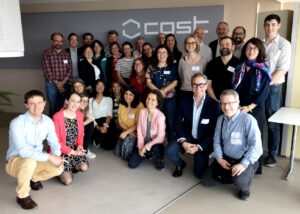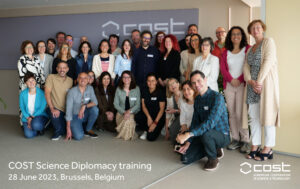Recently, ReConnect China cooperated with the COST Association (European Cooperation in Science and Technology) for the organisation of a science diplomacy training. The training was held at the premises of COST in Brussels on June 20 and involved 30+ researchers from newly funded COST actions. Regardless of the scientific discipline these experts represented, the whole group had a keen interest to learn more about what science diplomacy is and how it is reflected in their own work as internationally oriented researchers.

Katalin Alfoldi from COST opened the training and explained why science diplomacy is important for COST actions. Mostafa Shawrav from the Marie Curie Alumni Association introduced the COST principal investigators to the origin of science diplomacy and how it is operationalised today across various sectors (instruments). Stella Reschke from the European Science Diplomacy Alliance and DLR – Project Management Agency updated on the EU’s strategic approach to science diplomacy. For ReConnect China, Philipp Brugner showed some results from ZSI’s work on EU-China STI cooperation and from its comparative assessment about how research security in the cooperation with China is applied in Higher Education Institutions across some EU Member States.
For more interaction, the training also included a group work and an interview with Ágota Dávid from the Permanent Representation of Hungary to the EU, who, given her professional career until now, is a real science diplomat in action.
This training was the second after the June 2023-edition, about which you can read more in this ReConnect China post.
